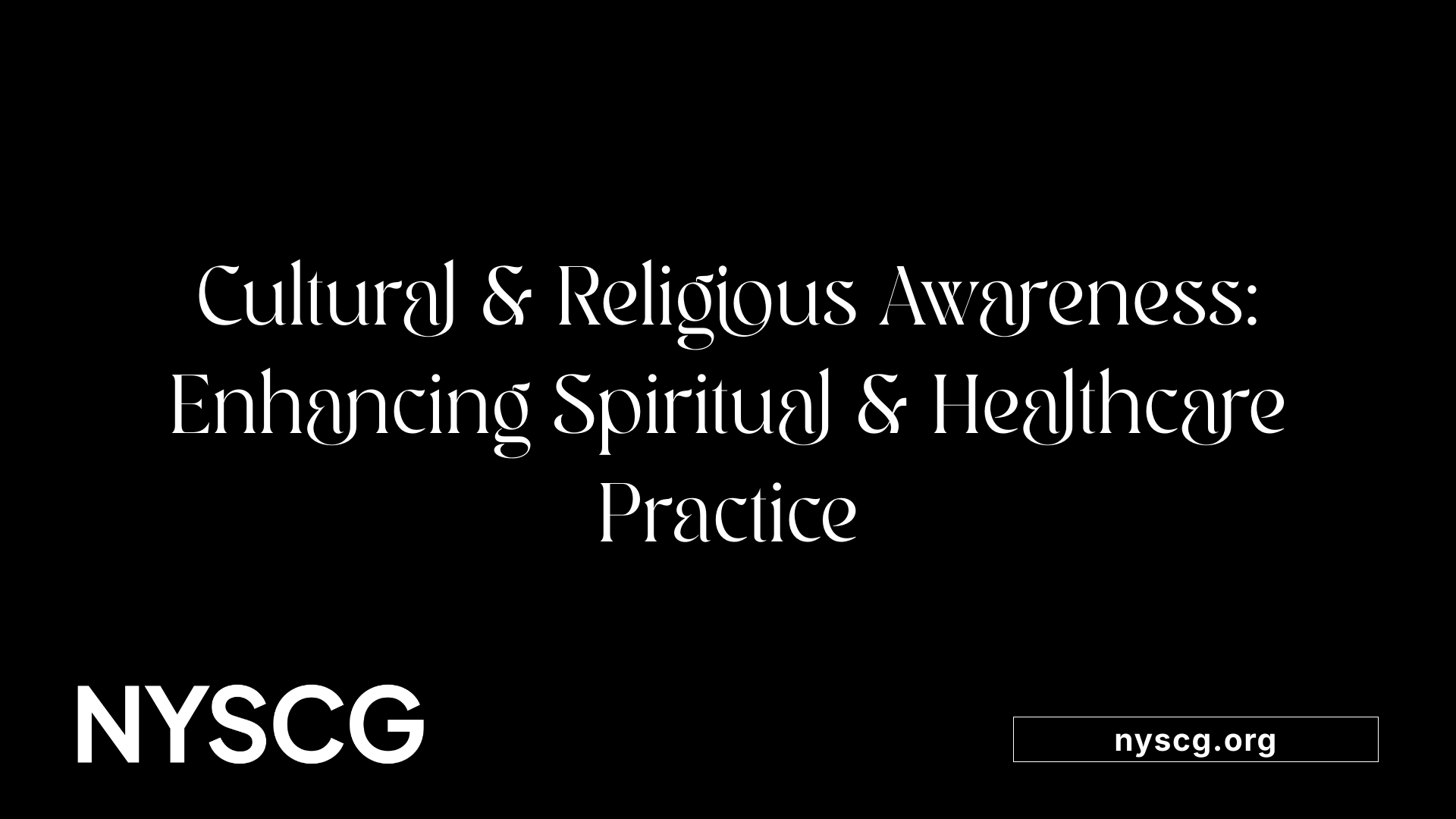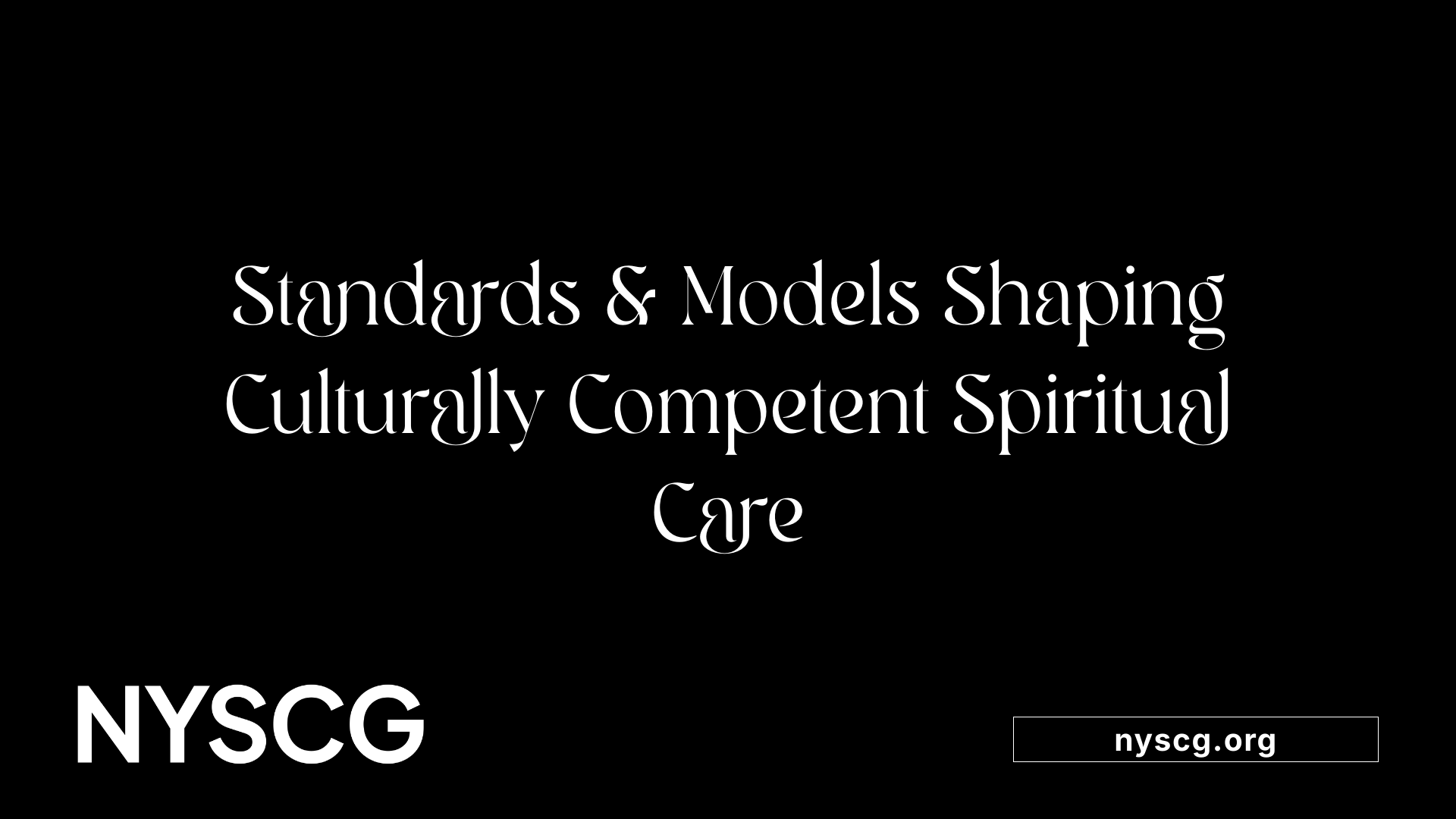The Importance of Cultural Competency in Chaplain Education


As societies become increasingly diverse, the role of cultural competency in chaplain education and healthcare practice has never been more vital. Effective spiritual care requires not only compassion and ethical integrity but also a deep understanding of the cultural, religious, and social backgrounds of the individuals served. This article explores the multifaceted components of cultural competence, its significance in spiritual and healthcare settings, and best practices for developing and applying these skills among chaplains and healthcare professionals.

Cultural competence is essential for providing effective and respectful services across diverse populations in healthcare and educational settings. It comprises four fundamental elements: awareness, attitudes, knowledge, and skills.
Awareness involves recognizing one’s own cultural background, biases, and assumptions. It requires self-reflection to understand how personal beliefs may influence interactions with others from different cultures.
Attitudes encompass openness, respect, and a genuine interest in learning about different cultural perspectives. Cultivating humility and curiosity encourages a non-judgmental attitude that values diversity.
Knowledge refers to understanding the cultural, religious, and social practices of various groups. This includes familiarity with different languages, customs, and worldviews that shape individuals’ experiences.
Skills involve effective communication and culturally sensitive practices, such as asking respectful questions, using interpreters, and adapting interventions to align with cultural preferences.
Implementing inclusive policies and practices is critical. Organizations should develop policies that promote equity, diversity, and inclusion, ensuring that all members feel respected and valued. Hosting cultural events and celebrations further demonstrates commitment to diversity, offering opportunities for learning and building community.
Creating a respectful environment entails fostering environments where individuals feel safe to express their identities and beliefs. This includes training staff on cultural humility, regular diversity training, and encouraging open dialogue.
By integrating these components, healthcare and educational institutions can reduce disparities, improve communication, and build trust with diverse populations. Such efforts ultimately lead to more equitable, effective, and compassionate care and learning experiences.
Summary of Best Practices:
| Practice | Description | Impact |
|---|---|---|
| Inclusive Policies | Developing organizational guidelines that support diversity and equity | Promotes fairness and reduces bias |
| Diversity Training | Regularly educating staff on cultural competencies | Enhances understanding and sensitivity |
| Celebrating Cultural Events | Hosting festivals and cultural awareness days | Builds community and appreciation |
| Respectful Environment | Creating spaces where identities are valued | Fosters trust and openness |
Incorporating these strategies as a cohesive approach helps organizations serve their communities better and bridge cultural gaps effectively, ultimately supporting positive outcomes and stronger relationships.
 Cultural competence plays a vital role in enhancing the quality of healthcare and spiritual support by fostering effective communication and building trust between providers and diverse patient populations.
Cultural competence plays a vital role in enhancing the quality of healthcare and spiritual support by fostering effective communication and building trust between providers and diverse patient populations.
Effective communication is often hindered by language and cultural differences. When healthcare professionals understand their patients' cultural and spiritual backgrounds, they can better interpret non-verbal cues, preferences, and needs. This understanding facilitates meaningful interactions and helps establish trust, which is fundamental for patients to feel safe and comfortable sharing sensitive information.
Addressing cultural and spiritual needs allows healthcare providers and chaplains to offer personalized care that respects each patient's beliefs and practices. Whether it involves accommodating religious rituals, understanding dietary restrictions, or respecting gender preferences, culturally informed care ensures that treatments align with individual values, particularly important during end-of-life decisions.
Reducing health disparities is another crucial benefit. Minority and marginalized groups often face obstacles like language barriers, limited access to culturally appropriate care, and biases within healthcare systems. Developing cultural awareness and humility among healthcare workers helps bridge these gaps, leading to more equitable health outcomes.
Patient satisfaction improves when individuals feel their unique cultural identities are acknowledged and valued. Spiritual care, in particular, benefits from cultural sensitivity, as chaplains and healthcare staff support the spiritual wellbeing by recognizing diverse beliefs and providing appropriate interventions. This person-centered approach promotes overall wellbeing and peace of mind.
Supporting holistic care involves integrating physical, emotional, social, and spiritual dimensions. By cultivating cultural competence, healthcare teams, including chaplains, can deliver comprehensive support that aligns with each person’s identity, leading to better health outcomes and quality of life.
| Benefits of Cultural Competency | How It Is Achieved | Impact |
|---|---|---|
| Improved communication | Cultural awareness, language skills, training | Better understanding, adherence to treatment |
| Trust-building | Demonstrating respect, cultural humility | Enhanced openness and cooperation |
| Addressing needs | Cultural and spiritual assessment | Personalized interventions and care |
| Reducing disparities | Inclusive policies, diverse staffing | Equity in health outcomes |
| Increased satisfaction | Respect for beliefs, responsive care | Higher patient and family satisfaction |
| Holistic care | Integration of physical and spiritual support | Overall health and wellbeing |
Ultimately, cultural competence supports a health system that respects individual dignity, promotes equity, and fosters a nurturing environment for healing and spiritual growth.
Healthcare providers and chaplains can improve their cultural skills through continuous education and training that emphasize cross-cultural communication, cultural humility, and awareness of diverse spiritual and cultural backgrounds. These learning opportunities often include workshops, courses, or certifications focusing on understanding different belief systems, practices, and social norms.
Self-reflection plays a critical role in developing cultural competence. By regularly examining their own biases, assumptions, and predispositions, practitioners foster a greater capacity for respectful, empathetic engagement with patients from various backgrounds.
Community engagement is another vital strategy. Interacting directly with different cultural groups allows healthcare professionals and chaplains to gain firsthand insights into their beliefs, values, and health practices. Such interactions help tailor care approaches to suit individual needs effectively.
Collaboration with diverse populations and within healthcare teams facilitates mutual learning and enhances cultural awareness. Building partnerships with community organizations or cultural leaders can inform more inclusive care practices.
Organizational policies also support the development of cultural competence. Implementing initiatives like language accessibility services, diversity training programs, and inclusive policies ensures a system-wide approach that benefits both staff and patients.
Finally, integrating spiritual care into practice, combined with fostering a shared sense of professional identity among both healthcare teams and chaplains, helps provide holistic, culturally sensitive support. These strategies together promote more equitable, respectful, and personalized patient care in diverse settings.

Cultural and religious awareness is fundamental in providing effective, respectful, and personalized care. It helps healthcare providers understand how patients' beliefs, values, and practices influence their health behaviors and decision-making.
In sensitive contexts like hospice and end-of-life care, recognizing diverse spiritual backgrounds allows providers to address concerns about suffering, death, and afterlife with compassion and relevance. This understanding fosters a supportive environment where patients feel valued and understood.
Developing cultural competence through ongoing training, self-reflection, and improved communication skills enables providers to overcome language and cultural barriers. This not only enhances trust but also ensures emotional comfort, which is crucial during vulnerable times.
Moreover, awareness of religious ethics and principles guides ethical decision-making. It helps align medical treatments with individual values and religious stipulations, resulting in more ethically sound and accepted care plans.
Overall, embracing cultural and religious differences improves care quality, promotes equity, and recognizes spirituality as a vital component of health and healing. It ensures that care is truly holistic, addressing physical, emotional, spiritual, and cultural dimensions for better health outcomes.

The standards for cultural competence in chaplaincy education are established by prominent organizations in the field, which set clear expectations for behaviors, skills, and knowledge necessary to serve a diverse patient population effectively. These standards emphasize self-awareness—understanding one's own cultural and spiritual background—and the importance of respecting and understanding different cultural and religious practices.
Training programs like those from the Association for Clinical Pastoral Education (ACPE) incorporate these standards into their curricula by defining competencies that chaplains must demonstrate at various levels—from foundational to expert. This structured approach ensures chaplains are equipped with the necessary skills for culturally appropriate interventions, including assessment, counseling, and collaboration.
Application of these standards involves rigorous training, ongoing education, and certification processes. Chaplains are encouraged to participate in continuous professional development, which includes learning about cultural and religious diversity, addressing personal biases, and refining interpersonal skills. Ethical considerations, such as respect for patient autonomy and religious tolerance, are integral to practice and are reinforced through standards and evaluation.
Ultimately, these standards aim to ensure that spiritual care is both culturally sensitive and ethically sound, aligning with broader health care quality requirements and accreditation benchmarks. This commitment supports the goal of delivering personalized, respectful, and effective spiritual support to all patients, regardless of their cultural background.
Cultural competence plays a vital role in shaping the qualifications required for spiritual care providers. It emphasizes the importance of ongoing education in cultural awareness, humility, and the knowledge of diverse religious and spiritual traditions. Providers are encouraged to develop skills that allow them to understand and respect individual beliefs, which enhances their ability to deliver personalized care.
The scope of practice broadens significantly when cultural competence is integrated. Providers are expected to recognize the importance of cultural context in emotional and spiritual crises, directly impacting clinical decisions and holistic approaches. This includes being familiar with shared spiritual languages and cultural norms, much like being bilingual in spiritual and cultural expressions, to foster trust and engagement.
Research in spiritual care also evolves with cultural competence, driving the development of evidence-based interventions that are culturally sensitive and effective. Studies show that tailored spiritual care improves patient satisfaction, trust, and health outcomes. The emphasis on cultural competence encourages a more inclusive research agenda that addresses diverse populations, ensuring that spiritual interventions are adaptable and respectful of different beliefs and practices.
Moreover, cultural competence enhances interprofessional collaboration. Chaplains and healthcare teams work together seamlessly by understanding cultural nuances, fostering mutual trust, and setting shared goals. This collaborative approach ultimately results in better spiritual and health outcomes, emphasizing the importance of continuous professional development in cultural and spiritual knowledge.
In summary, integrating cultural competence into spiritual care not only elevates provider qualifications but also expands their practice scope. It stimulates comprehensive research and promotes teamwork, all aimed at delivering culturally sensitive, equitable, and effective spiritual care.
In an increasingly interconnected and diverse world, embedding cultural competence into chaplain education and healthcare practices is essential for delivering truly inclusive and effective spiritual care. By fostering ongoing professional development, adhering to ethical standards, and embracing cultural humility, chaplains and healthcare professionals can meet the complex needs of varied patient populations. This commitment not only improves health outcomes and patient satisfaction but also advances the core principles of respect, equity, and dignity. As the field evolves, continual efforts to enhance cultural awareness and competency will be fundamental in shaping a healthcare environment where every individual’s spiritual and cultural identities are validated and honored.
All you need is the will to make the world a better place.
New York State chaplain group inc. is a tax deductible organization with a federal tax Id number 92-383-4921